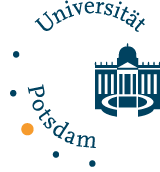CV
Education
„The world is just too rich for people to spend both their undergraduate and graduate careers studying linguistics”. Noam Chomsky, The Generative Enterprise, p.78.
| 1983 | M.A. Linguistics, University of Konstanz Supervisors: Arnim von Stechow, Urs Egli |
| 1985 | Dr. Phil., Linguistics, University of Passau, Supervisors: Sascha Felix, Hans Werner Eroms |
| 1989 | Habilitation, Linguistics |
In addition to linguistics, I set out studying political science, mathematics, and philosophy at the University of Regensburg. I found political science too dull, and gave it up after one semester. I was doing relatively okay in mathematics, but felt it was better for me to have a life instead of studying linguistics, philosophy and math at the same time, so I gave mathematics up after two semesters. I stayed with linguistics mainly because of my inspiring teacher Peter Staudacher. I would have loved to continue with philosophy (favorite teacher: Franz von Kutschera) but the student administration of the University of Konstanz kindly advised me to eventually focus on something if I wanted to ever get a degree.
Positions Held
| 1983 | WHK, Linguistics Department, University of Konstanz (Prof. Urs Egli) |
| 1983 - 1993 | Wissenschaftlicher Assistent, Linguistics, University of Passau (Prof. Sascha Felix) |
| 1992 | Visiting professor, University of Stuttgart |
| 1993 - present | Full professor (C4), Grammar Theory (Syntax & Morphology), Dept. Linguistics, University of Potsdam |
During my Passau time, I was also teaching regular courses at the University of Salzburg at the invitation of Gaberell Drachmann.
In 1983, I got a PhD scholarship of the Friedrich Ebert Stiftung but did not accept it because of the job offer from Sascha Felix for becoming a member of his Passau team. In 1992, I got a Heisenberg scholarship of the Deutsche Forschungsgemeinschaft after my habilitation and would have gone to the Netherlands (the best place for linguistics on the continent) with it, but did not accept it because of the Potsdam professorship.
I spent a lot of time from 1993 on (look at the publication gap in my CV!) on building up the Department of Linguistics in Potsdam, an on contributing to building up the humanities faculty. In retrospect, this administrative activity certainly is my major contribution to academia. I particularly enjoyed the possibility of closely working together with East German colleagues, and I am proud of having made a small contribution to forming a unified Germany.
Academic Service
| 1993 - 1999 | Director of the Center of Excellence (“Innovationskolleg”) Formal Models of Cognitive Complexity, funded by the Deutsche Forschungsgemeinschaft (a collaborative research group unifying linguistics, psychology, and theoretical physics) 199 |
| 1999 - 2002 | Director of the Research Group Conflicting Rules funded by the Deutsche Forschungsgemeinschaft, again bringing together linguistics, psychology, and theoretical physics |
| 2002 - 2006 | Deputy Director of the Collaborative Research Center (SFB 687) Information Structure, funded by the Deutsche Forschungsgemeinschaft (together with the linguists of Humboldt University Berlin) |
| 2008 - 2015 | Member of the Review Board Linguistics of the Deutsche Forschungsgemeinschaft |
| 2018 - present | Member of the grants committee for Research Training Grants, Deutsche Forschungsgemeinschaft |
I am proud of having directed to first major DFG research grants of the newly founded University of Potsdam, viz. the Innovationskolleg, and the Forschungsgruppe, and I am proud of having contributed to bringing the first Collaborative Research Center to Potsdam. I stepped down as a director of the Research Group in order to better prepare the SFB 687 proposal, and decided to step out of the board of the SFB 687 in order to create space for younger people.
I consider my work for the Deutsche Forschungsgemeinschaft, both first in the linguistics review board and now in the national grants committee for RTGs as my second major contribution to academia. It is also the most inspiring, pleasant and challenging work experience in my career.
I served various academic functions at my university (vice dean of the faculty, chairperson of the faculty council, etc.).
Conferences
Together with Jindra Toman, I founded Generative Grammatik des Südens (GGS), a small workshop series intended to focus in generative syntax/generative grammar. I think such more regional academic networks (covering Germany, in that case) are quite effective career boosters. It is nice to know that GGS continues to hold conferences for more than 30 years.
For a syntactician, it is obvious I was quite delighted to have presented at GLOW for four times in my early academic career. A fifth presentation at GLOW was not held, mainly because my coauthor and me did not manage to make the promised theoretical model work. After my administrative break, I did not really manage to make it into big conferences in the time when I focused on psycholinguistics (not more than one AmLaP presentation). With the family growing, it also became more difficult to attend conferences, and from 2008 on I rarely went to anything. I may have regretted that initially, but nowadays I find the time spent with the children way more important. I made attempts of returning to the conferences in the second half of the last decade, but realized (after having been an invited speaker at Barcelona workshop) that the benefit possibly coming from my presentation is more than dwarfed by the damage to my (and your) children’s future done by the carbondioxide emissions. So I decided to stop attending conferences I cannot reach by train.
